|
|
|
Sort Order |
|
|
|
Items / Page
|
|
|
|
|
|
|
| Srl | Item |
| 1 |
ID:
130866


|
|
|
|
|
| Publication |
2014.
|
| Summary/Abstract |
Curbing corruption is vital for China's future. But the exposure of corruption cases can only damage public confidence in the CCP and the state more generally. Corruption associated with toxic food, bogus medicines, grave abuses of power and criminal 'black societies' has produced a series of public scandals in China. Without reform, further occurrences could rapidly erode the legitimacy not just of the police and other judicial organs, but also of the ruling Chinese Communist Party (CCP). The recent trial of Bo Xilai, the former Chongqing party secretary and member of the party's elite 25-member Politburo, showcased the kind of corruption that China's past president Hu Jintao warned could lead to 'the collapse of the Party and the downfall of the state'. In 2011, the Bank of China inadvertently reported that between 1994-2008 as many as 18,000 corrupt officials had fled the country for destinations in Europe, America and other parts of Asia, plundering an estimated $120 billion from state-owned enterprises and other criminal activities. The costs of maintaining domestic public order have also grown rapidly, and, for the first time, domestic security outlays approved by the 2012 National People's Congress (NPC) exceeded defence, in part over concerns about the growth of mass protests, fraud, corruption and organised crime, and the need to strengthen weiwen (stability) and social harmony.
|
|
|
|
|
|
|
|
|
|
|
|
|
|
|
|
| 2 |
ID:
061847
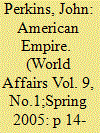

|
|
|
| 3 |
ID:
133563
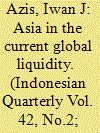

|
|
|
|
|
| Publication |
2014.
|
| Summary/Abstract |
In contrast with the pre~1997/98, today's emerging Asia registers excess savings. Since early 2000s, the liquidity was further boosted by in?ows of capital including those going through the banking sector. After a brief, yet sharp, interruption at the beginning of the global ?nancial crisis, in?ows resumed albeit of different form and inducted by different agents. Nonetheless, the global liquidity sphere has clearly changed. When the quantitative easing tantrum began in May last year, volatility returned. Largely due to a lack of innovative policy response, the episode of vacillating flows produced repercussions not different than in the past because the incentive system remains unchanged. Consequendy, vulnerability still rises with capital ?ows. The 'rational' response of agents is equally predictable, raising the risk of financial instability and exacerbating the already widening income disparity. Nothing is fundamentally new, everyone continues to "dance with the system."
|
|
|
|
|
|
|
|
|
|
|
|
|
|
|
|
| 4 |
ID:
130943
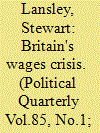

|
|
|
|
|
| Publication |
2014.
|
| Summary/Abstract |
Is 'predistribution' as championed by Ed Miliband, or old fashioned 'redistribution' as adopted, if stealthily, by Labour from 1997, the best way to create greater equality? Some critics have argued that a strategy of predistribution-aimed at closing the income gap before the application of taxes and benefits-would not work and that it will be necessary to rely mainly on redistribution. This article examines the potential impact of weak and more radical predistribution-style measures on one of the key drivers of inequality-'wage compression'. It examines the potential of a mix of policies for raising the wage floor. It argues that reliance on traditional redistribution would face its own set of constraints and that creating a more equal distribution of the cake, before taxes and benefits, is a necessary condition for lowering the risk of continuing economic crisis.
|
|
|
|
|
|
|
|
|
|
|
|
|
|
|
|
| 5 |
ID:
133455
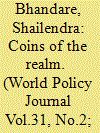

|
|
|
|
|
| Publication |
2014.
|
| Summary/Abstract |
OXFORD, England-We live in a globalized world where financial developments in one region can have an impact on a vastly different and geographically disparate location. The forces joining them are those of money, wealth, and finance, which are deeply interlinked, or so we tend to think. But the world around us has always been globalized, albeit to different degrees and involving different shades of financial undercurrents. An interesting prism to see this continual globalization is through the role itinerant and global currencies and monetary unions have played.
Money is often defined as "as any object (or record of that object) which is regularly used to make payments according to a law which guarantees its value and ensures its acceptability." Acceptance is thus at the core of any particular object being used as money. The spread of monetary traditions across regions happens because people from diverse locations accept particular monies, in the form of coins, paper, or other instruments, to make payments. The fact that coins can circulate as monetary objects greatly enhances their utility. They enable money to be spent and saved by facilitating their division.
|
|
|
|
|
|
|
|
|
|
|
|
|
|
|
|
| 6 |
ID:
139174


|
|
|
|
|
| Summary/Abstract |
The use of the term Naxalism has become synonymous with Maoist activities in India. All such activities are branded as Left Wing Extremism (LWE). The Maoist movement calls for a complete transformation of the political, social and economic systems as existing in India. In its essence, it challenges the validity of the Indian Constitution and rejects the Parliamentary system, seeking to replace it with a new social order. It draws its strength from existing weaknesses in society where certain vulnerable sections have been marginalised and exploited and, thus, can be penetrated and swayed by Maoist ideologues, who promise the people a fulfillment of their aspirations and a life of dignity and self-respect. The Naxal movement has a relationship to Communism. Karl Marx propounded that in order to fight feudalism and capitalism, “You must have a scientific philosophy and a sound theory, for a workers movement to be built up on a scientific basis”. In dealing with the problem of social change, Marx examined two concepts, the first dealing with the “forces of production” and the second with the “relations of production”. He was more interested in examining the military concepts of the social revolutionaries, which earlier lay in the domain of great political leaders, legislators and pioneering reformers. According to Marx, the social process would lead to revolution at a certain stage of development and the material productive forces of society would come into conflict with the existing relations of production. He emphasised that change could be
brought out only by revolution and not by peaceful means.1 The Naxal ideology flows from this line of thought.
|
|
|
|
|
|
|
|
|
|
|
|
|
|
|
|
| 7 |
ID:
130577
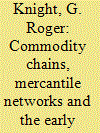

|
|
|
|
|
| Publication |
2014.
|
| Summary/Abstract |
This paper discusses the foundational history of a major European mercantile house in colonial South East Asia in the context of commercial developments that had both a regional and global reach. In so doing, it seeks to relate a local and historically particular event to a broader world pattern defined by three rapidly evolving commodity chains, based respectively on the production, distribution and consumption of cotton goods, coffee and opium. In this context, the paper argues that the hard-won commercial success of the firm in question resulted from a significant degree of withdrawal from the bilateral ties between colony and metropolis inherent in the cotton and coffee commodity chains. In their place, the firm had recourse to several varieties of the inter-Asian trade, of which the opium commodity chain constituted the key dimension.
|
|
|
|
|
|
|
|
|
|
|
|
|
|
|
|
| 8 |
ID:
040783
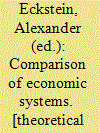

|
|
|
|
|
| Publication |
London, University of California Press Ltd, 1971.
|
| Description |
366p
|
| Standard Number |
0520017293
|
|
|
|
|
|
|
|
|
|
|
|
Copies: C:1/I:0,R:0,Q:0
Circulation
| Accession# | Call# | Current Location | Status | Policy | Location |
| 008880 | 330.12/ECK 008880 | Main | On Shelf | General | |
|
|
|
|
| 9 |
ID:
130958
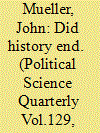

|
|
|
|
|
| Publication |
2014.
|
| Summary/Abstract |
IN A 1989 ESSAY, FRANCIS FUKUYAMA ADVANCED the notion that, with the death of communism, history had come to an end.1 This somewhat fanciful, and presumably intentionally provocative, formulation was derived from Hegel, and it has generally been misinterpreted. He did not mean that things would stop happening-obviously a preposterous proposal.2 Rather, he contended that there had been a profound ideological development. With the demise of communism, its chief remaining challenger after the extinguishment earlier in the century of monarchy and Fascism, liberalism-democracy and market capitalism-had triumphed over all other governmental and economic systems or sets of ordering principles. Looking for future challenges to this triumph, he examined the potential rise of destructive forms of nationalism and of fundamentalist religion, but found them unlikely to prevail. Thus, the triumph of liberalism was likely to be permanent.
This article evaluates developments over the subsequent quarter century and argues that Fukuyama seems to have had it fundamentally right. Beginning with the countries of Eastern Europe, democracy continued its progress after 1989. Moreover, capitalism increasingly came to be accepted, so that when the world plunged into widespread economic crisis after 2007, proposed remedies variously recommended tinkering with the system, not abandoning it.
In the meantime, violent forms of nationalism that surged in some places in the last decade of the old century scarcely proved to be much of a challenge to these trends, and the same seems likely to hold for violent forms of fundamentalist religion that surged in some places in the first decade of the new one. In fact, the significance of both of these illiberal developments seems to have been much exaggerated.
In addition, there was a striking decline of civil warfare during the decade after 1989 to low levels that have held now throughout the new century.
|
|
|
|
|
|
|
|
|
|
|
|
|
|
|
|
| 10 |
ID:
094085
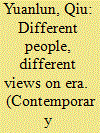

|
|
|
| 11 |
ID:
127792


|
|
|
|
|
| Publication |
2013.
|
| Summary/Abstract |
There are many different ways of responding to wrongdoing: person-centered or object-centered, victim-centered or perpetrator-centered, and fault-oriented or not. Among these approaches, requiring innocent beneficiaries to disgorge the fruits of historical wrongdoings of others is attractive because it is informationally the least demanding. Although that approach is perhaps not ideal, at least it is feasible where other responses are not, and doing something is better than doing nothing in response to grievous historical wrongdoing. Depending on circumstances, disgorgement can be in whole or in part, in kind or in cash. Even without the full information that disgorgement itself requires, general redistributive taxation might be justified as a tolerably close approximation.
|
|
|
|
|
|
|
|
|
|
|
|
|
|
|
|
| 12 |
ID:
093995
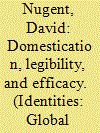

|
|
|
| 13 |
ID:
130981
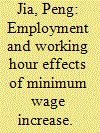

|
|
|
|
|
| Publication |
2014.
|
| Summary/Abstract |
Using a difference-in-differences model, the present paper provides empirical evidence of minimum wage effects on employment and working hours in China. The results show that male employment is not affected by a minimum wage increase, although men's working hours do increase. In contrast, female employment is more likely to be negatively affected by a minimum wage increase, while their working hours remain unchanged. This may lead to women being in a more disadvantaged position in the workforce, and adopting a monthly minimum wage may induce firms to extend men's working hours. Therefore, to better protect disadvantaged workers, we suggest that minimum wage regulation should focus on the target group of less-educated women, and that a unified minimum hourly wage needs to be set for both full-time and part-time workers. Meanwhile, the importance of human capital accumulation should be addressed in alleviating the negative effects of minimum wage increases.
|
|
|
|
|
|
|
|
|
|
|
|
|
|
|
|
| 14 |
ID:
128199
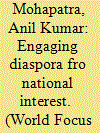

|
|
|
|
|
| Publication |
2014.
|
| Summary/Abstract |
The growing influence of diasporas on foreign affairs and the international behavior of the states has been a worldwide academic finding and a reported fact. As independent actors they have operated as lobbies which have actively influenced homeland (ancestral or kin-states) foreign policies and that of the host lands as well (Shain et al 2003). Especially the developing countries in their mission of development have tried to rope in their communities abroad in the process. This global phenomenon of diaspora-homeland linkage has debate on economic and political systems, national culture and international relations.
|
|
|
|
|
|
|
|
|
|
|
|
|
|
|
|
| 15 |
ID:
130899
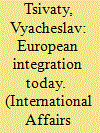

|
|
|
|
|
| Publication |
2014.
|
| Summary/Abstract |
It so happens that we are witnesses to the great geopolitical changes, where one political and economic system is replacing another, where the boundaries of political regions and alliances are shifting, and where the system of international relations is institutionalizing, integrating and transforming. A key characteristic that defines the development vectors of countries in the post- Soviet space is the search by newly independent states for an attractive integration nucleus. On the whole, from all indications, the process of the formation of a more or less stable system of foreign political ties between the post-Soviet states is complete. This accounts for the prevalence of the selective integration vector, namely, the fact that collaboration along the lines of the Customs Union and the EU has taken center stage.
|
|
|
|
|
|
|
|
|
|
|
|
|
|
|
|
| 16 |
ID:
132600
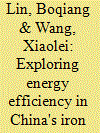

|
|
|
|
|
| Publication |
2014.
|
| Summary/Abstract |
The iron and steel industry is one of the major energy-consuming industries in China. Given the limited research on effective energy conservation in China×s industrial sectors, this paper analyzes the total factor energy efficiency and the corresponding energy conservation potential of China×s iron and steel industry using the excessive energy-input stochastic frontier model. The results show that there was an increasing trend in energy efficiency between 2005 and 2011 with an average energy efficiency of 0.699 and a cumulative energy conservation potential of 723.44 million tons of coal equivalent (Mtce). We further analyze the regional differences in energy efficiency and find that energy efficiency of Northeastern China is high while that of Central and Western China is low. Therefore, there is a concentration of energy conservation potential for the iron and steel industry in the Central and Western areas. In addition, we discover that inefficient factors are important for improving energy conservation. We find that the structural defect in the economic system is an important impediment to energy efficiency and economic restructuring is the key to improving energy efficiency.
|
|
|
|
|
|
|
|
|
|
|
|
|
|
|
|
| 17 |
ID:
128216
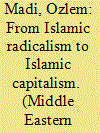

|
|
|
|
|
| Publication |
2014.
|
| Summary/Abstract |
The rise of Turkish Islamic capitalism, and with it an Islamic bourgeoisie and the accompanying lifestyle has profound implications for the Muslim world, since the Turkish Muslims have been backed by a relatively successful democratic and liberal system that has allowed them to integrate more easily into the global system. Focusing mainly on the members of the Islamic-oriented Association of Economic Entrepreneurship and Business Ethics (?G?AD), the aim of this article is to demonstrate the inherent (in)compatibility and contradictions between Islam and capitalism in contemporary Turkey, and by extension in the Muslim world. From the start, for the Turkish Muslim bourgeoisie, the burning questions were 'how to earn' and, more importantly, 'how to consume' within a capitalist system while still not transgressing Islamic boundaries. In order to overcome these challenges, the article argues that, rather than creating an 'alternative Islamic economic system', Islamic actors have reduced - in some cases, even eliminated - this discursive and ideological tension between Islam and capitalism by (a) trying to introduce Islamic morality into capitalism and (b) redefining both Islam and capitalism. Through these mechanisms they have also broadened and deepened Turkish modernity.
|
|
|
|
|
|
|
|
|
|
|
|
|
|
|
|
| 18 |
ID:
092148
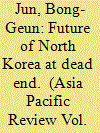

|
|
|
|
|
| Publication |
2009.
|
| Summary/Abstract |
Since Chairman Kim Jong-il's reported stroke in August 2008, the stability or instability of the North Korean system has come under the spotlight. North Korea's one-man ruling communist and state-planned economic system will constantly come under pressure at home and abroad for change. For now, North Korea withstands the pressure for change with a strong state mechanism. If Pyongyang continues to allow its systemic rigidity to hinder opportunities for adjustment and change, then the deepening internal contradictions, the people's growing discontent, and increasing discord with the external environment may push the North Korean system to a critical breaking point. As the uncertainties shrouding the North Korean regime and system steadily increase, it has become urgent to accurately analyze and assess the present and the future of North Korea. While preparing for an uncertain future of North Korea, it is also necessary that the members of the Six-Party Talks exercise more efforts to generate genuine and positive changes in North Korea.
|
|
|
|
|
|
|
|
|
|
|
|
|
|
|
|
| 19 |
ID:
134114
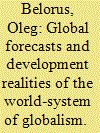

|
|
|
|
|
| Publication |
2014.
|
| Summary/Abstract |
is shaping the destiny of every country in the world.
Today, long-term forecasts of global development for the next 25 and 50 years rely on strictly imperative norms; the "breakthrough into the future" scenarios should proceed from the actual unity of the world and take into account the transition-transformation nature of its development.
Global transformation has no end; the social and economic convergence of countries with different levels and characteristics of development is a new phenomenon that calls for in-depth political and economic study. The expert community has already concluded that recurring crises of overproduction will alternate with non-cyclical crises of overconsumption of resources, while the accompanying new technologies of social production and economic relations will become even more dynamic.
|
|
|
|
|
|
|
|
|
|
|
|
|
|
|
|
| 20 |
ID:
122807
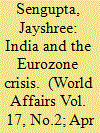

|
|
|
|
|
|
|
|